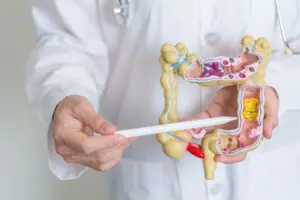
Leaky gut syndrome: Leaky gut is a term that’s been popping up everywhere. You may think you have it because of gut issues like bloating or pain, or you may have read about it online. But what exactly does it mean? In this guide, you can learn everything about leaky gut syndrome.
What is a leaky gut?
Your gut is where your body breaks down food and absorbs nutrients. The inside of your gut is lined with a thin wall made of special cells. This wall works like a filter: it lets good stuff pass into your body and keeps out bad stuff.
Leaky gut happens when the wall becomes too loose or damaged, and things that shouldn’t pass through, like undigested food and harmful bacteria, start leaking into your bloodstream.
Also Read | Childhood gut toxin may fuel colon cancer surge in the young
Is leaky gut a medical diagnosis?
In medical terms, intestinal permeability means the gut lining becomes more porous or leaky. Doctors and scientists agree that increased intestinal permeability is completely real and can be seen in certain diseases like irritable bowel syndrome or type 1 diabetes. But leaky gut syndrome is not a formal medical diagnosis.
Common symptoms linked to leaky gut
People who believe they have leaky guts report symptoms like bloating, gas, fatigue, brain fog, skin problems, and joint pain. While the symptoms are genuine, they can also stem from other health conditions. That’s the only reason why a leaky gut is so confusing, and there is no single symptom to confirm it.
What causes the gut to become leaky?
Eating too much processed food, sugar, or unhealthy fats might damage the gut lining over time. Artificial additives and alcohol can also be harmful. Stress impacts your whole body, including your digestion. Long-term stress can weaken the gut bacteria and mess with your gut. Frequent use of painkillers or acid blockers might irritate the gut and damage the lining.

Can a leaky gut be healed?
While there is no magical cure, many experts agree that some lifestyle changes can help you improve your gut health. You can include foods rich in probiotics and prebiotics. Consider a supplement with guidance, like zinc or probiotics, to restore beneficial bacteria. Yoga meditation and deep breathing, or even a daily walk, can help you calm your nervous system.
Leaky gut is not a myth. There is some truth behind the concept, but science is still catching up. What we mean to convey is that your gut health is important. Taking care of them can have a positive ripple effect on your digestion, skin, and overall well-being. Instead of worrying about labels or trending terms, focus on what you can control, eat well while managing stress, and sleep enough. You just need to listen to your body. If you’re dealing with ongoing gut issues like bloating or pain, it’s a good idea to see a doctor. They can help you rule out serious medical conditions. A medical professional can safely guide you even if a leaky gut is involved.








